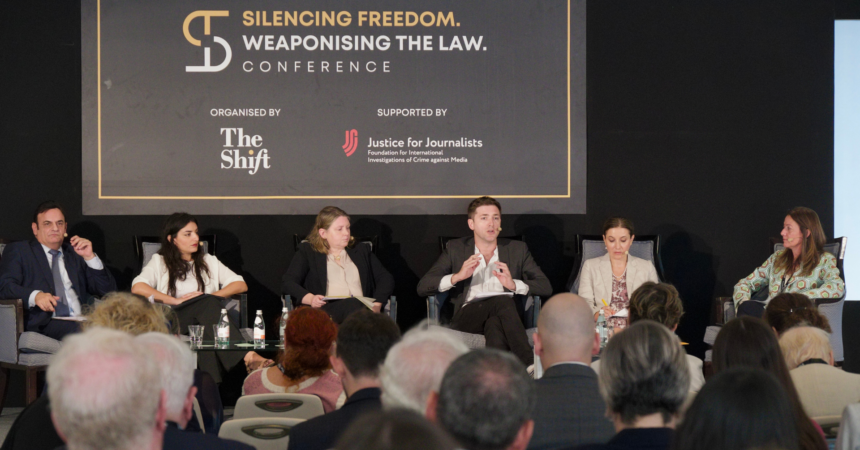With the end of year deadline for finalising negotiations on the EU’s Anti-SLAPP directive now approaching, the onus is on to agree on just how far the new legislation will go as well as smoothing out differences of opinion between the European Parliament, the European Council, journalists, and media organisations.
Those on the receiving end of strategic lawsuits against public participation (SLAPP) and the lawyers and activists that support them who took part in The Shift’s conference ‘Silencing Freedom. Weaponising the Law.’ are proactively looking at ways to counter the “systematic threat” of abusive lawsuits aimed at silencing and censoring them.
But as EU legislators push to pass legislation, abusive suits “are changing” as abusers have become increasingly creative, using legislation other than ‘traditional’ defamation and libel suits.
This makes it even more crucial to have a wide-ranging legal framework that offers the maximum protection, not the current ‘watered down’ offering from the European Council.
“The EU is still debating laws to protect journalists five years later; meanwhile, those who file SLAPPs are finding new ways to intimidate,” said Caroline Muscat, The Shift’s founder and managing editor and moderator at the event.
But while journalists wait to find out how much protection the EU will give them, curating more varied support systems is necessary. This includes tackling those facilitating abuses, such as predatory lawyers and reputation managers, not just the plaintiffs themselves.
Another tactic mentioned was the ‘name and shame’ approach, including a registry of abusive suits, the people filing them, and the lawyers pushing them.
But MEP David Casa, also a panellist at The Shift’s conference, explained how the anti-SLAPP legislation, informally known as ‘Daphne’s Law’, faces challenges.
He explained how some member states watered down the proposed legislation as they find it “difficult to give up control” of their national judicial system, refusing to name names.
Casa also discussed the importance of “a strong early dismissal mechanism”, a key bone of contention in ongoing trilogue discussions, to be present in the law. “If we don’t have this mechanism, we shouldn’t have a directive at all. It is the most important bit.”
Such a mechanism would allow courts to throw out unfounded legal cases before lengthy proceedings can begin, weeding out abusive cases from potentially legitimate ones.
Another important element of the directive is the introduction of consequences for those who file such abusive and unjustified suits. Casa said this would “make those intending to file a SLAPP suit think twice.”
This safeguard would force bad actors to consider the costs of filing such suits, balancing out the “asymmetric costs” newsrooms face.
Such unbalanced costs are one of several challenges employed by abusers discussed by panellist Caoilfhionn Gallagher, an international human rights barrister and expert in journalists’ safety and media freedom at Doughty Street Chambers.
Gallagher’s notion of ‘Lawfare’, the use of tactics used in traditional warfare in legal abuses against journalists, includes “asymmetric costs” as one of its key tenets.
Other tactics included attrition, involving lengthy legal cases designed to wear down journalists and newsrooms with high morale but low resources, and decapitation, which involves targeted legal attacks at the heads of organisations to discredit or silence them.
She also spoke of how abusers are even going after family members of journalists and media owners, as well as their legal teams.
Another panellist, Coalition Against SLAPPs in Europe (CASE) steering committee member Charlie Holt, discussed the importance of proactive measures against such abuses. “raising awareness and delegitimising their use” through name-and-shame tactics.
Holt said that if enacted, the European Council’s watered-down version of the proposed legislation would mean the Anti-SLAPP law would only apply to “10% of SLAPP cases”.
This, he said, shows how crucial it is to safeguard the draft law’s core elements.
The matter is currently being discussed between EU institutions, and it is hoped a final draft of the directive will be finalised by the end of the year. It will take another three years for any legislation to enter into force.













4️⃣0️⃣ GOVERMENT SLAPPS AGAINT THE SHIFT NEWS,
but the term ‘poacher turned gamekeeper’ comes to mind in relation to 🇪🇺European Splapp rules.
Sorry, but I think this can only happen in a very corrupt environment.